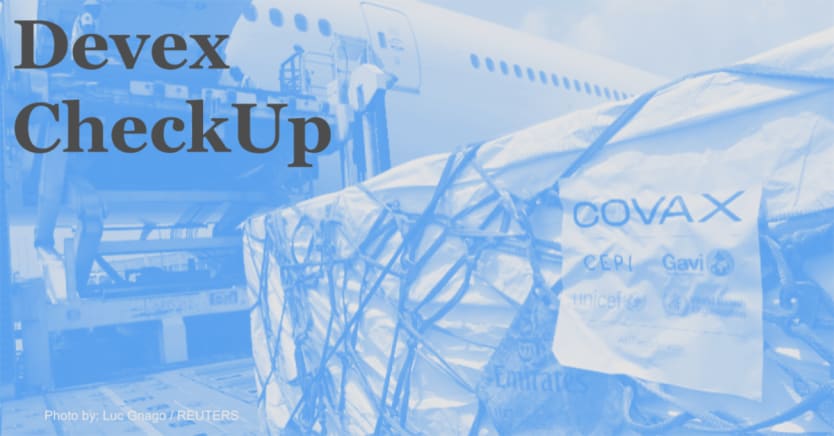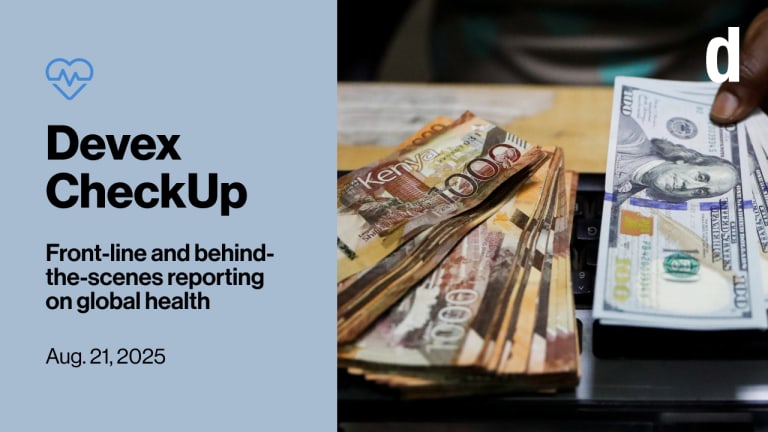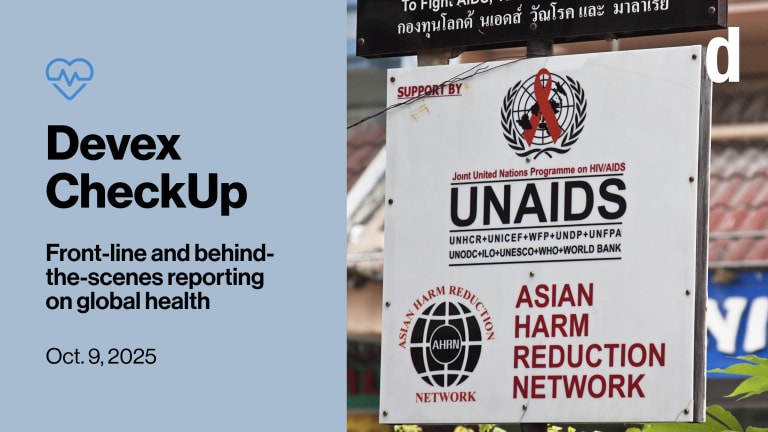
Today we bring dispatches from the World Health Summit held this week in Germany. While much of the buzz around pandemic preparedness is at the global level — a treaty, stronger World Health Organization, a financial intermediary fund — participants at the summit emphasized that the burden of preventing pandemics lies locally. And a lot boils down to the health care workforce, particularly in remote areas.
“That last mile of delivery is the first mile of health security — but we forget that,” said Dr. Michael Ryan, the executive director of WHO Health Emergencies Programme.
• Participants said there is not a global workforce prepared to recognize possible pandemics. Health workers are the first line of defense to pick up on strange illnesses and raise the alarm. But countries need enough of them, and they need training on disease surveillance, access to molecular laboratories, and health facilities equipped to prevent infection.
This is a preview of Devex CheckUp
Sign up to this newsletter for exclusive global health news and insider insights, in your inbox every Thursday.
• “The most important lesson that we learned from COVID-19 is that country preparedness should be at the center of global preparedness. … We are as strong as our weakest,” said Dr. Jaouad Mahjour, assistant director-general of emergency preparedness and international health regulations at WHO.
• “Frankly, if we paid, trained, equipped, and had more community health workers, it's probably the single most powerful lever we could pull,” said Peter Sands, executive director of The Global Fund to Fight AIDS, Tuberculosis and Malaria. Governments also need to turn health care into a sustainable career path, he added, saying people can’t plan their lives around short-term project cycles. Some countries train health workers but aren’t always able to put them on the national payroll.
• Many countries pay community health workers very little — or don't pay them at all — which is a dangerous move, according to Dr. Seth Berkley, the CEO at Gavi, the Vaccine Alliance. In moments of crisis, such as a pandemic, countries are dependent on quickly scaling up the number of health workers to respond and roll out vaccines, which is difficult when workers are not compensated. Health workers facing unsafe working conditions with little support instead quit and join other sectors.
• Sands said that the conversation around health workers needs a reframe. The environmental sector, for example, is better at articulating the returns on investments — advocating for “green growth” and “green jobs.” Many national finance ministers see health budgets as a money pit rather than a growth driver. "Who better to put some money in the pockets of — if you want broader socioeconomic development gains?” he asked. “But we've got to do a better job of selling that.”
And this is not to say that international coordination is irrelevant, participants said. “As we build this out — build global solutions … what we need to understand is none of that will work unless it's articulated with community-facing local systems,” WHO’s Ryan said.
Taking their shot
The Bill & Melinda Gates Foundation committed $1.2 billion at the summit to end wild and vaccine-derived poliovirus. A broader polio pledging event was also held, which raised $2.6 billion toward the Global Polio Eradication Initiative’s strategy through 2026. The strategy needs $4.8 billion for full implementation.
In an op-ed for Devex, Columbia University’s School of Public Health’s A. Kayum Ahmed calls for an examination of the role that nonstate actors such as foundations play at forums like these and their “outsized influence.”
"Large donors such as the Gates Foundation, have aided this profit-centered approach to global health by initially failing to support intellectual property waivers that would allow the COVID-19 vaccine recipe to be shared in time to save millions of lives," he writes.
Read: Gates Foundation pledges $1.2B to end polio as virus stages a comeback
Opinion: Who’s on stage at World Health Summit shows who’s in charge
The ‘great resignation’
Over 1,200
—That’s the number of nurses who resigned in Zimbabwe last year. It’s also three times the number that left in 2019, Dr. Matshidiso Moeti, the WHO regional director for Africa, said during the summit.
The “great resignation” among health care workers in high-income countries in the wake of COVID-19 is triggering a search for new workers from elsewhere, summit participants said, causing concern that health workers in lower-income countries will leave their homes in hopes of better working conditions and pay.
Outbreak update
The Ebola outbreak in Uganda is increasingly worrying. Uganda announced a three-week lockdown in two districts and the first death in Kampala — the capital city, where over 3 million people live in close proximity. During the summit, WHO’s Moeti linked inadequate numbers of health workers in rural Uganda to the spread of the virus. There have been 60 confirmed cases, 20 probable cases, and 44 deaths.
In an op-ed for Devex, Seed Global Health’s Irene Atuhairwe and Dr. Vanessa Kerry urge support for health workers on the front line.
“We also have a moral obligation to scale up wise and thoughtful measures to protect those directly in the firing line. Not only will this save lives but will also reduce the risk of the virus spreading, a new, more infectious strain of Ebola from emerging or … losing more health care workers,” they write.
Opinion: Don't repeat COVID mistakes as Uganda Ebola outbreak spreads
Medical first
My colleague Jessica Abrahams reports from the World Cancer Congress in Geneva that the Medicines Patents Pool announced a new agreement for voluntary licensing of nilotinib, a drug used to treat chronic myeloid leukemia, so that it can be produced by generic manufacturers in lower-income countries. It’s the MPP’s first deal for a noncommunicable disease. But that doesn’t mean that the deal isn’t flawless.
Read more: Medicines Patent Pool signs first cancer deal — but there's a catch (Pro)
+ Devex Pro members can also read about what South Africa's new vaccine regulatory status means. Not a Devex Pro member yet? Start your 15-day free trial of Devex Pro today.
Inadequate response
A global health professional tweeted Tuesday that she was sexually assaulted by a WHO staffer during the summit. The agency’s Director-General Tedros Adhanom Ghebreyesus tweeted that he was horrified and invited her to reach out to him. She later tweeted that she was overwhelmed with support, including from WHO. However, the World Health Summit’s reply: “We hope that the situation clears up quickly” — was criticized online as inadequate and “not a responsible response.”
Superbugs in Ukraine
The war in Ukraine is increasing the spread of antimicrobial resistance, health experts said. Infection prevention and microbiological diagnosis, which help ensure patients receive the right antibiotics, are often not available in war zones. Environmental factors are also a problem: Heavy metals from explosions contaminate the groundwater and increase bacterial resistance.
“Right now in the hospital, the most resistant infections that we are seeing are people that come from Ukraine that got wounded in battles,” says Dr. Laura Jung, a clinician at the University of Leipzig Medical Center in Germany. Another expert points out that antimicrobial resistance isn’t easily confined by national borders.
Read: The war in Ukraine is fueling antimicrobial resistance
What we’re reading
Vision sector receives largest single gift ever with a $15 million MacKenzie Scott grant. [Devex]
One Wikipedia contributor has created 1,750 articles illustrating the lives of female scientists who haven’t gotten their due. [The Washington Post]
Mexico has the ninth-highest caseload of monkeypox worldwide but hasn’t yet acquired vaccines — which has spurred frustrated citizens to go abroad for inoculations. [Reuters]
Update Oct. 20, 2022: This piece has been updated to reflect that $2.57 billion was pledged toward the Global Polio Eradication Initiative’s strategy.









